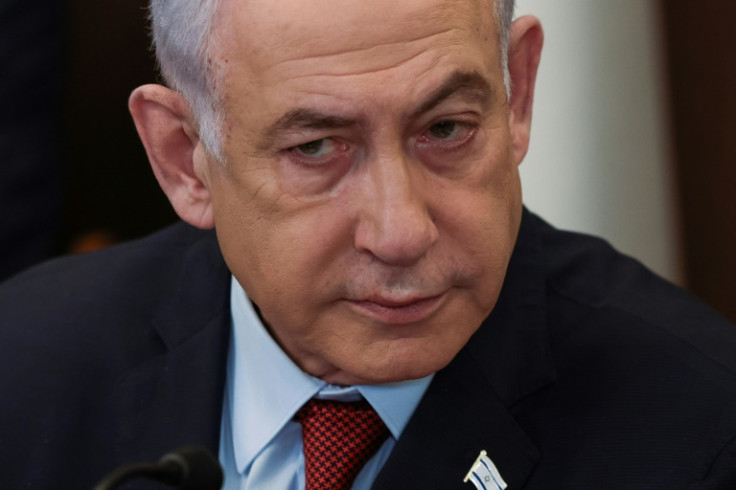Israel PM To Undergo Hernia Surgery As Pressure Rises Over Gaza War

Israeli Prime Minister Benjamin Netanyahu was to undergo hernia surgery on Sunday, his office said, as protesters stepped up pressure on his government nearly six months into the Gaza war with Hamas.
Deputy Prime Minister and Justice Minister Yariv Levin will stand in while Netanyahu, 74, undergoes full anaesthesia, his office said.
It added that doctors had discovered the hernia on Saturday during a routine checkup, and that after consultations the decision was made for the premier to undergo surgery after completing his daily schedule.
The procedure also comes with his government imperilled over the issue of military conscription for ultra-Orthodox Jews.
Deadly air strikes again pounded the Gaza Strip as talks towards a truce between Israel and Hamas were set to resume in Cairo on Sunday, according to Egyptian television. But neither Netanyahu nor Hamas voiced optimism.
To help alleviate the suffering of Gaza's 2.4 million people, an aid ship was sailing from the Mediterranean island-nation of Cyprus to bring 400 tonnes of food, as part of a small flotilla.
Foreign powers have ramped up aid airdrops, although United Nations agencies and charities warn this falls far short of the dire need and say trucks are the most efficient way of delivering aid.
On Thursday the world's top court ordered Israel to "ensure urgent humanitarian assistance" in Gaza without delay, saying "famine is setting in".
At least 77 people were killed in bombardment and combat during the previous 24 hours, most of them women and children, said the health ministry in the Hamas-ruled territory.
A UN Security Council resolution on March 25 demanded an "immediate ceasefire" and the release of all hostages held by militants, but the binding resolution has failed to curb the fighting, including in or around hospitals.
World Health Organization chief Tedros Adhanom Ghebreyesus said in a post on X, formerly Twitter, that an Israeli air strike on Sunday hit "a tent camp" inside the Al-Aqsa hospital compound in central Gaza, killing four people and wounding 17.
Tensions have risen between Israel and its chief backer the United States over the spiralling civilian death toll, and especially over Israeli threats to send ground forces into Gaza's crowded far-southern city of Rafah.
Washington has nonetheless approved billions of dollars worth of bombs and fighter jets for Israel in recent days, The Wall Street Journal reported, citing unnamed officials.
Pope Francis, in his Easter message, renewed his appeal for a ceasefire in Gaza, that "access to humanitarian aid be ensured" and for "the prompt release of the hostages seized on October 7", when Hamas attacked Israel and triggered the war.
In Jerusalem, where Christians believe Christ's body was anointed after he was taken down from the cross, few people visited the sacred sites usually crowded at Easter.
Hamas's attack resulted in about 1,160 deaths in Israel, mostly civilians, according to an AFP tally of Israeli official figures.
Israel's retaliatory campaign has killed at least 32,782 people, mostly women and children, according to the Gaza health ministry.
Palestinian militants also seized around 250 Israeli and foreign hostages. Israel believes about 130 remain in Gaza, including 34 who are presumed dead.
Under intense pressure to bring the captives home, Netanyahu on Friday approved a new round of ceasefire talks to take place in Doha and Cairo.
But on Sunday he told a news conference that "Hamas is hardening its positions" in the talks.
A Hamas official, speaking on condition of anonymity, earlier expressed doubt the process could bring results because Netanyahu is "not interested." The official said the Islamist group had not decided on whether to send a delegation to the new round of talks "in Cairo or Doha."
Egyptian TV station Al-Qahera, which is close to the country's intelligence services, had said the talks would resume in Cairo on Sunday.
Netanyahu has vowed to continue the war by sending troops in against Hamas fighters in Rafah, where around 1.5 million civilians are sheltering.
Domestic pressure has been growing on Netanyahu as those opposed to his ring-wing government and the hostages' families have found common cause.
Thousands of Israelis calling for boosted efforts to free the hostages held in Gaza and for Netanyahu's ouster marched in Jerusalem Sunday, the second consecutive night of mass protests.
Netanyahu is also under pressure with Israel's decades-old exemption from military service for ultra-Orthodox Jews poised to end Monday, barring a last-minute delay.
The prime minister's coalition depends on ultra-Orthodox support, which could unravel if the exemption ends.
In Gaza, vast areas of which have been reduced to a rubble-strewn wasteland, heavy fighting has rocked neighbourhoods around several Gaza hospitals.
Israel accuses Palestinian militants of hiding inside and in tunnels beneath the medical facilities, and of using patients and medical staff as cover, charges which the groups deny.
The army said Saturday that it had "continued to eliminate" militants around the largest hospital, Al-Shifa in Gaza City, after earlier reporting around 200 killed in the operation which began two weeks ago on Monday.
The Gaza health ministry said 107 patients remained inside Al-Shifa, including 30 with disabilities, and that the army had stopped attempts to evacuate them.
A short drive away, Gaza's Christian minority held a vigil service to mark Christ's resurrection.
Israeli military operations were also ongoing at two hospitals in the southern city of Khan Yunis -- at Nasser hospital, according to the Hamas government press office, and at Al-Amal hospital, according to the Red Crescent.
In the Israeli-occupied West Bank, a new Palestinian government -- which has partial administrative control -- was sworn in Sunday. Newly-appointed prime minister Mohammed Mustafa said his government's "top national priority" was ending the war.
Fighting continued beyond Israel's borders, with Syria's defence ministry reporting Israeli strikes near Damascus.
Israel said it "eliminated" a missile unit commander of Lebanon's Hezbollah movement in a south Lebanon air strike.
© Copyright AFP {{Year}}. All rights reserved.



















